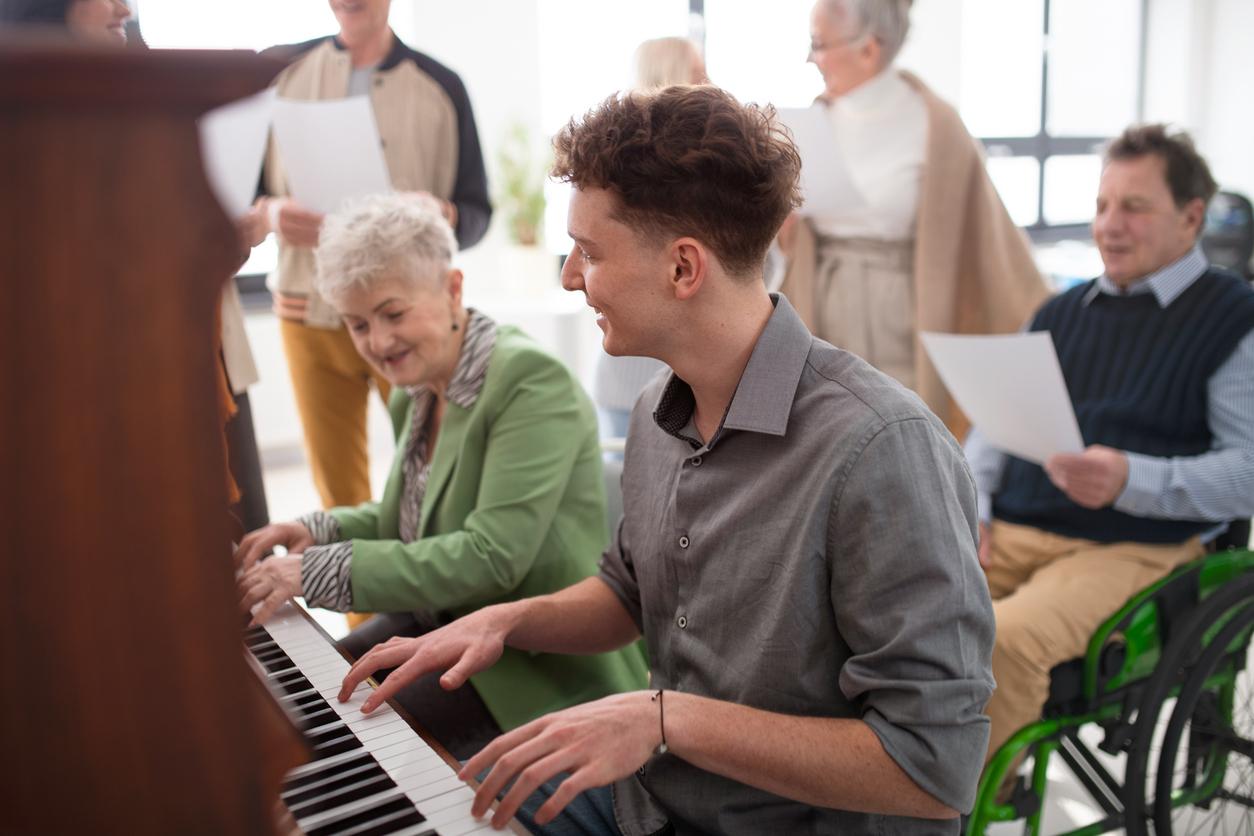
The Brain Foundation supports a special program for carers
7,670 Dutch people under the age of 65 are known to the general practitioner as a patient with a form of dementia. This is often frontotemporal dementia, which is – after Alzheimer’s disease – the most common form of dementia at a young age. Such a diagnosis also has repercussions on the patient’s family and environment. Professor Marjolein de Vugt is working on a support program for informal carers with support from the Brain Foundation.
Those 7,670 dementia patients is probably just the tip of the iceberg. This only concerns people with dementia registered with the general practitioner. Experts estimate that the number of actual cases is closer to 12,000. Bee frontotemporal dementia or FTD, the brain cells in the front part of the brain: the frontal and temporal lobes disappear. FTD is also known as Pick’s disease or frontal lobe dementia. One of the most striking features of frontotemporal dementia is that it occurs at a relatively young age. The majority of people who get the disease are between the ages of 40 and 60.
FTD is violent for the environment
Marjolein De Vugt is professor of psychosocial innovations in dementia, health care psychologist and co-head of the Alzheimer Center Limburg. She and her team started the Partner in Balance program a few years ago; an information program for relatives of people with dementia. De Vugt: “FTD is a form of dementia in which there are problems in behavior and language. That is different from Alzheimer’s. There you mainly see problems with memory and attention. FTD is difficult to recognize. Something else seems to be going on. dementia. Your partner will behave differently, for example he or she is disinhibited or more introverted, such as with depression or burnout. Because the diagnosis is often missed, this leads to tensions within the family. as a result. It can be very violent for the environment.”
Progress is difficult to predict
FTD therefore arises because brain cells in the frontal lobe (behavioural area) and the temporal lobe (language area) die. The first symptoms are subtle and arise very gradually, so that they are indeed quickly missed. How FTD will ultimately develop is difficult to predict. Some people remain stable for a long time, others deteriorate quickly. There are three variants of frontotemporal disorders.
Symptoms of FTD
The first form is the behavioral variant of frontotemporal dementia. A person with this variant of FTD may make inappropriate comments or jokes and may exhibit unrestrained behavior without regard for the environment. Also gobbling and eating a lot, making impulsive decisions and having more and more difficulty with planning and organizing are sometimes part of this form of FTD.
The second form of FTD is the language variant. People who have this have difficulty speaking, understanding, reading and writing. The last form is the movement variant of frontotemporal dementia. You notice this by changes in a person’s motor skills and difficulties with movement, such as shaking, difficulty walking, falling frequently and problems with coordination.
Partner in balance program
As mentioned, the disease and the associated behavioral changes make it very difficult for the patient’s environment. In addition, informal carers are often left to their own devices, resulting in psychological complaints and overload. De Vugt: “The Brain Foundation came up with the idea to adapt the Partner in Balance program to a more specific target group: informal caregivers of people with FTD. We deal with topics that informal caregivers have to deal with: how do you deal with a changing partner? your life with FTD How do I take care of my partner without dying myself How do I combine care with work The informal carer chooses four themes and can work with them online under the guidance of a coach. We call this informal carer’s program Partner in Balance and are busy developing it.”
Test panel of informal carers
By stimulating informal carers to actively tackle their problems and learning to recognize their own needs and provide them with tools to better deal with their situation, the Brain Foundation and the De Vugt research team hope to support them and make them more resilient. A discussion panel of informal carers provided input for including the right themes in the programme. “We are now looking for informal carers who want to test the program. We find these informal carers, for example, through FTD Fellows, lectures, Alzheimer Nederland or the Foundation for Knowledge Center for Dementia at a Young Age. If people feel called to do so, they can report to help to test the program, gladly even!”
The course of FTD
The course of frontotemporal dementia is also unpredictable. Some people regress quickly, while others progress more gradually. To date, it is not possible to cure or stop the disease from FTD; only behavioral symptoms can be treated with the help of medication. As more parts of the brain are damaged, the symptoms will increasingly resemble those of Alzheimer’s disease. Life expectancy in FTD averages six to eight years after diagnosis.
This research was made possible in part by…
The destination gift of the Brain Foundation for the ‘Partner in balance’ program comes from the Coby van Nieuwkerk Fund, named after Jacoba Frederika van Nieuwkerk. She made a career in clinical geriatrics: the care of the elderly with medical, social and psychological disorders. Coby’s desire to do something special with her assets took shape thanks to brother and administrator, Marius van Nieuwkerk.
Coby made his career at a time when medical doctors did not yet want to see geriatrics as a separate field, but she persevered. This made her one of the founders of geriatrics in the Netherlands. For years she would be the only trainer for geriatrics in the Netherlands. She was made an honorary member of the Dutch Association for Clinical Geriatrics. She also received the Hilda van Suylenburg Prize, an emancipation prize for her commitment to the position of older women in psychiatry. She also became an officer in the Order of Orange Nassau. In 1999 she retired.
In 2007, Coby noticed the first signs of frontotemporal dementia or FTD. She was already retired by then. Her family and friends noticed that Coby was getting quieter. Her participation in conversations waned. She had orientation problems. Telling the time and counting were also difficult. She also developed word-finding disorders, the first signs of dementia. Later, apraxia was added, the inability to handle a knife and fork well.
Coby wanted her estate to go to the Brain Foundation. “Because frontotemporal dementia is still under-researched, and FTD is more common in our family, we have focused Coby’s legacy on FTD and established a Named Fund: the Coby van Nieuwkerk Fund. There will be two destination gifts from her estate. A translational study on early diagnosis of FTD and a study to improve the counseling of young dementia patients. More research is desperately needed. Coby would have been proud,” said her brother.
Would you like to know more about bequeathing to the Brain Foundation? read more.
This article was produced in collaboration with the Brain Foundation.















